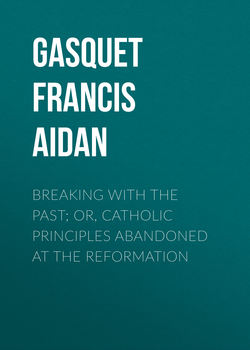Breaking with the Past; Or, Catholic Principles Abandoned at the Reformation

Реклама. ООО «ЛитРес», ИНН: 7719571260.
Оглавление
Gasquet Francis Aidan. Breaking with the Past; Or, Catholic Principles Abandoned at the Reformation
PREFACE
I. THE POPE'S AUTHORITY
II. THE HOLY MASS
NOTE. COMPARISON OF THE MASS AND THE COMMUNION SERVICE
III. THE PRIESTHOOD
IV. THE CHURCH BY LAW ESTABLISHED
BOOKS SUGGESTED FOR READING
Отрывок из книги
TO-DAY we begin the work of Advent. During these weeks of preparation for the great feast of Christmas it is usual and useful to turn our thoughts to some of the great principles upon which our faith as Catholics is grounded, in order that we may realise more fully all that our Blessed Lord's coming into this world has done for mankind in general and for our individual souls in particular. It will not therefore be altogether foreign to this purpose if during these Sundays of Advent I ask your consideration of certain Catholic principles which appear to me to have been deliberately abandoned in the great religious revolution of the sixteenth century, known as the Reformation, but to which our Catholic forefathers in England and in Ireland clung with heroic constancy and for which they suffered loss of worldly goods and even laid down their lives.
And first, I should at the outset like to disclaim any desire to enter into mere matters of controversy. In these days, when so many aspirations and prayers for a return to Christian Unity are being uttered and which in the face of the common enemy find an echo in the heart of every Catholic, the bitterness engendered by the controversial spirit is, to say the least, wholly foreign to the work of Union. But as a first step to that Christian Unity we all pray for, it is surely necessary to recognise the points of departure, out of which our differences have grown. We cannot proceed far along the path towards agreement unless we understand how we first began to differ, and therefore, not in any spirit of bitterness or controversy. I desire to speak of facts as they seem to me, and to point out what was really done at the time of the Reformation in England, which still has obvious consequences in all English-speaking countries. As far as I am concerned at present those who hold that what was done in regard to religion in the sixteenth century was well done may continue to hold this belief. All I desire at this time is to ascertain what was done.
.....
To obtain the support of Parliament the King suggested that the nation had incurred the extreme penalties of praemunire by admitting the legatine powers of Cardinal Wolsey, even though this had been done with his royal knowledge and authority. His lay subjects were at once pardoned for a mere technical offence against the statute laws, but the clergy were excluded, in order to hold the penalties in terrorem over them. With his royal hand on the throats of his ecclesiastical subjects he demanded a recognition of his Headship over the Church in England, and finally Convocation, after a debate which extended over two and thirty sessions, gave an unwilling assent to a clause admitting the King as "the Protector and Supreme Head" of the English Church. This was the thin edge of the wedge by which the cleavage from Rome and the Pope was subsequently effected. At the time, there can be no doubt that the inward meaning of the acknowledgment was not understood. Dean Hook says that the statement was not "regarded as inconsistent with the legitimate claims of the papacy," and as Froude admits, it is certain that "the title was not intended to imply what it implied when, four years later, it was conferred by Act of Parliament, and when England virtually was severed by it from the Roman Communion."
In 1532 by an Act entitled "The Submission of the clergy" the king received their pledge not to legislate in ecclesiastical matters in Convocation without his royal leave. By this "Submission" the English Church deprived itself of all corporate action; and in the same year the aged Archbishop Warham died. "We cannot doubt," writes the late Dr. James Gairdner, the most competent judge of the events of this reign and himself not a Catholic, "We cannot doubt that the event (i. e. the death of the Archbishop of Canterbury) at once suggested to the King a new method of achieving his end" and divorcing Queen Katherine. He obtained from the Pope the appointment of Thomas Cranmer, a priest who in defiance of the canons had secretly married in Germany the niece of Osiander, the German Reformer, as a second wife.
.....